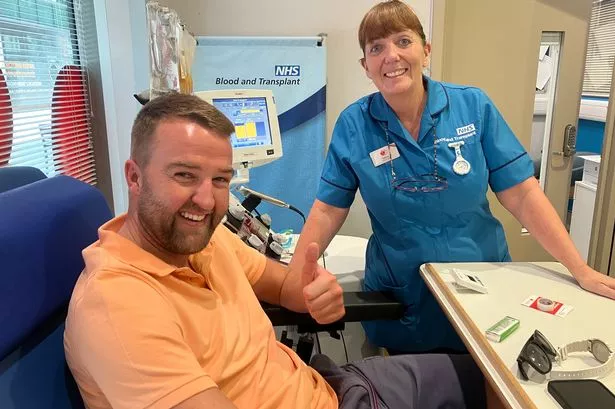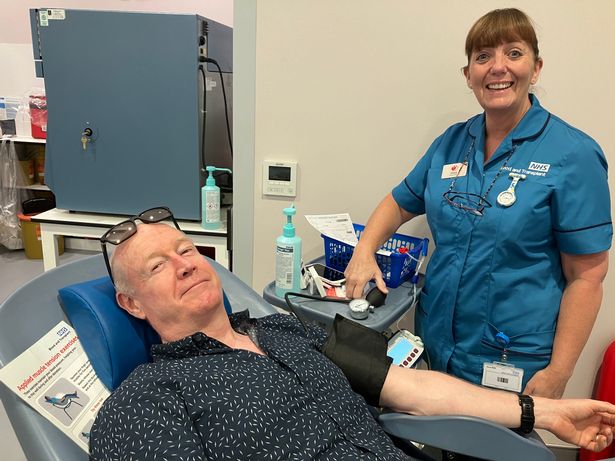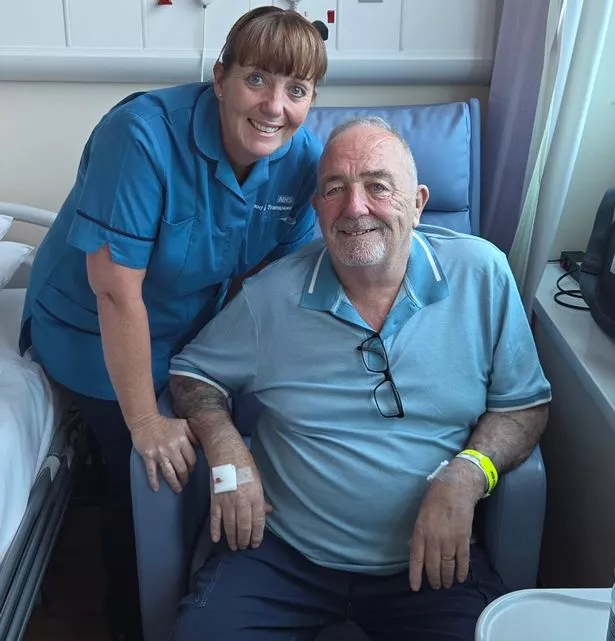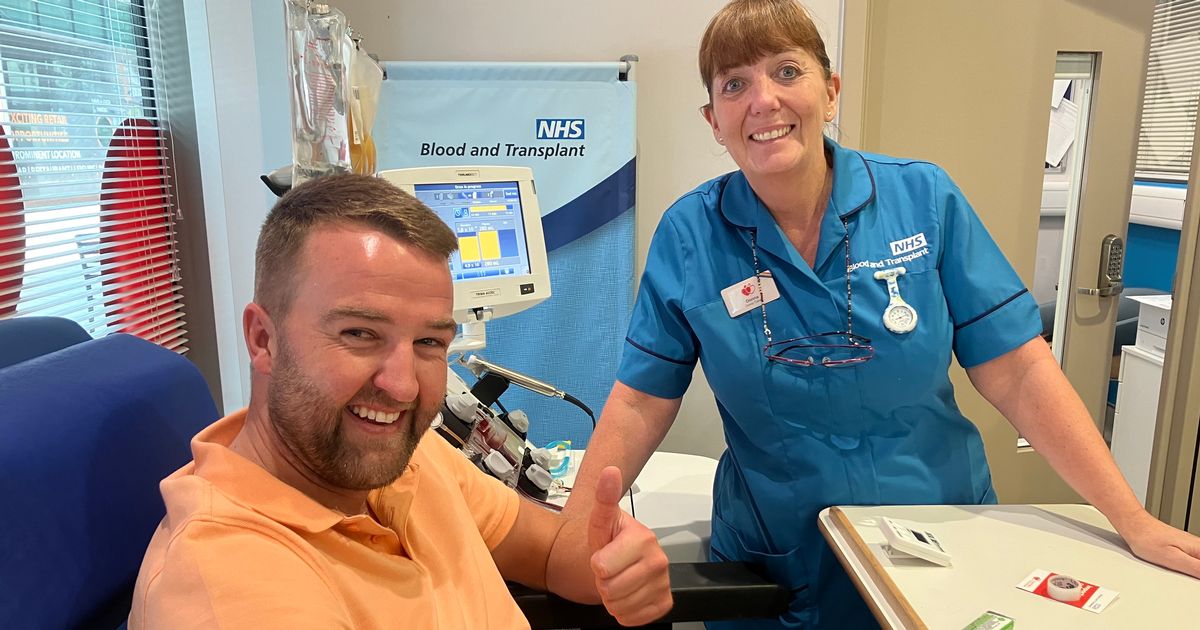“My wife was very ill and she didn’t get a blood donation but the NHS saved her life. So you’ve got to give back a bit.” Donor Jordan Swann with NHS nurse Donna Scott
Donor Jordan Swann with NHS nurse Donna Scott
In the heart of Liverpool, the unsung heroes of the national health service gather every day, constantly replenishing the blood stocks of hospitals across the country. From minor surgeries to chemotherapy for cancer patients, many common operations would screech to a halt, if not for the generous actions of blood donors.
Up to 100 donations of blood and platelets are collected at the Liverpool Blood Donor Centre, in St Paul’s Square, Old Hall Street, every day. Donna Scott, who has worked in NHS blood donor clinics for 35 years, said: “I was 19 when I started, and it was because of my mum seeing the advert in the ECHO and saying ‘there’s a job you might like’. I always wanted to do nursing so when it came up I went for it and I’ve been here ever since.
“Things have changed. Everything was written by hand, there were no computers. Donors used to have a little blue book and they’d get a certificate after each donation.
“We didn’t have an appointment system then so people would just come in. You’d never know how many you were going to do, they used to just come in and sit and wait, and if it got to half seven and there were still people waiting we’d have to say no more.”
Nurse Beth Moore said: “Some days we have over 100 appointments. We have two pickups a day. A driver who works for us will come, we bag everything up, check everything, then it goes to Manchester for processing. That’s where the check the donations and split them into different products. From there it will be issued to different labs, different hospitals.
“Everybody thinks a blood transfusion is just a bag of blood, whereas it gets separated. They take out the white blood cells, separate the plasma and take the blood product which is really just the red blood cells.
“The hospitals have a list of what blood type they require – this many O negative, this many A positive. They give us a list of what they’re expecting to use.”
Jordan Swann, 33, from Aintree, attended the donor centre to give platelets, which can help avoid blood loss during chemotherapy and surgery. Platelets last just seven days after they’ve been donated, so the NHS relies on people donating regularly throughout the year.
So far, Jordan has donated platelets 93 times. He said: “I just enjoy helping people out and giving other people a chance the staff are lovely as well so Im happy to help and I get a little buzz out of it.
“My blood type is A negative so it’s actually quite rare, so they text us quite regularly saying come in we need some donations because they sometimes get low but I’m always happy to help.
“There’s a few people on a few hundred donations. Someone where I live in Aintree is on 400 or 500. So he’s doing quite well and I’m on my way up there.”
Another donor was Chris Jones, 64, from Formby, who attended to give his highly-valued O-negative blood type. O negative donors are the lifeblood of the emergency services, known as “universal donors”, as anyone can safely receive red blood cells from them.
 Donor Chris Jones with nurse Donna Scott
Donor Chris Jones with nurse Donna Scott
Although about 8% of the population has O negative blood, it accounts for around up to 16% of hospital requests for red blood cells. While O negative donors are compatible with everyone, regardless of blood type, they themselves can only safely receive blood from other O negative donors.
Chris said: “It’s the one that’s on all the ambulance and in casualty. So they don’t need to find out a patient’s blood type, they just know straight away.
“My wife was very ill and she didn’t get a blood donation but the NHS saved her life and she was in hospital a long time. So you’ve got to give back a bit.”
But many more O negative donors are needed to keep up with the demand, as the NHS says its supplies are “critically low”. NHS Blood and Transplant has revealed there are 5,463 donors in the North West with the vital blood type whose last donation was more than a year ago.
England remains on amber alert for low stocks of O type blood. Gerry Gogarty, director of blood supply for NHS Blood and Transplant, said: “Our ‘missing’ O negative donors in the North West have the power to relieve the pressure on supplies of this vital blood type.
“If you are O negative and haven’t given blood in a while, please book an appointment to donate today. Don’t hesitate – patients need you now.”
Hospitals across England need more than 5,000 blood donations every day to ensure they have the blood they need to treat patients for a wide variety of reasons, including traumatic injuries or accidents, cancer treatments, sickle cell and childbirth. Blood has a shelf life of 35 days so it is vital stocks are constantly replenished.
Donna knows the importance of this first-hand, as her brother Mark Foley was given a blood transfusion just last week after undergoing vascular surgery at Aintree Hospital. She said: “As part of that they needed two units of blood during surgery.
 Donna and her brother Mark
Donna and her brother Mark
“Last October he had a really big bleed on his stomach and he required six units that time and without that he probably wouldn’t be here today.
“To me it hits home, how even though I’ve worked here 35 years it makes you realise how important it is for people to give blood. People can be a bit blasé about it. They think they can go into hospital and there will be fridge full of blood there if they need it but it’s not always like that. There could be an amber alert and we need blood, there could be people waiting for blood.”
Daily appointment availability for donor centres with more than 10 slots that day is now published each morning at donor centre appointment tracker to make it easier for donors to book an immediate appointment.
